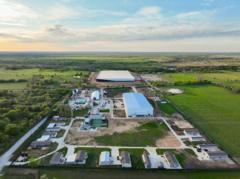As Musk establishes his headquarters in rural Texas, the community grapples with potential changes to its character and economy.
**Texas Transformation: Elon Musk's New Corporate Campus Sparks Mixed Reactions**

**Texas Transformation: Elon Musk's New Corporate Campus Sparks Mixed Reactions**
Elon Musk's shift to Texas brings both opportunity and concerns for local residents.
In the quiet plains of Central Texas, a transformation is underway as Elon Musk, one of the world's most recognized entrepreneurs, sets up his new corporate base. Departing from Silicon Valley, Musk's initiatives, which include facilities for his companies SpaceX and The Boring Company, have begun to reshape this rural area, located thirty minutes east of Austin, Texas.
Texas has emerged as a promising alternative for tech companies, given its relatively low cost of living, an abundance of skilled labor from nearby cities, and a welcoming regulatory environment. Musk's departure from California appears motivated by both business decisions and a shift in political ideology, as evidenced by a controversial law in California and his stated opposition to what he describes as a “woke mind virus.”
The development comprises several significant structures, but not all residents share enthusiasm for the new arrivals. City Manager Sylvia Carrillo highlights a divided sentiment among locals in Bastrop, where approximately 12,000 residents live. While some speculate on the imminent job opportunities for families in the area, others express concerns that rapid development could threaten the local charm and lead to an urbanized landscape.
Bastrop’s growth is a product of broader economic trends, including aftermaths of the pandemic. Real estate agents note a surge in housing demand, correlating strongly with Musk’s projects, while community members like Alfonso Lopez articulate a nuanced perspective, voicing both caution about Musk’s approach and appreciation for the technological innovations his companies bring to the community.
Contrasting opinions are also evident on online forums, where some locals express apprehension regarding Musk’s corporate practices, reflected by The Boring Company’s recent environmental violations. Yet, municipal officials are focused on protective legislation that aims to balance growth and preservation of the town's historical essence.
Plans for housing developments to accommodate workers suggest long-term investment in the area, although stakeholders acknowledge delays potentially tied to environmental factors. Local governance has recently instituted measures to sustain green spaces amidst the new expansions.
Amid these changes, Musk's operations are expected to receive state financial support, intended to stimulate economic growth and job creation. As larger corporations navigate the local landscape, Bastrop officials hope to manage the transition while ensuring community integrity remains intact.
Local sentiments about Musk and his enterprises continue to evolve as Bastrop adjusts to the influx of innovation and investment. As the community anticipates what these changes might bring, the roadway ahead remains open to diverse opinions and a future marked by Musk's enduring presence.
Texas has emerged as a promising alternative for tech companies, given its relatively low cost of living, an abundance of skilled labor from nearby cities, and a welcoming regulatory environment. Musk's departure from California appears motivated by both business decisions and a shift in political ideology, as evidenced by a controversial law in California and his stated opposition to what he describes as a “woke mind virus.”
The development comprises several significant structures, but not all residents share enthusiasm for the new arrivals. City Manager Sylvia Carrillo highlights a divided sentiment among locals in Bastrop, where approximately 12,000 residents live. While some speculate on the imminent job opportunities for families in the area, others express concerns that rapid development could threaten the local charm and lead to an urbanized landscape.
Bastrop’s growth is a product of broader economic trends, including aftermaths of the pandemic. Real estate agents note a surge in housing demand, correlating strongly with Musk’s projects, while community members like Alfonso Lopez articulate a nuanced perspective, voicing both caution about Musk’s approach and appreciation for the technological innovations his companies bring to the community.
Contrasting opinions are also evident on online forums, where some locals express apprehension regarding Musk’s corporate practices, reflected by The Boring Company’s recent environmental violations. Yet, municipal officials are focused on protective legislation that aims to balance growth and preservation of the town's historical essence.
Plans for housing developments to accommodate workers suggest long-term investment in the area, although stakeholders acknowledge delays potentially tied to environmental factors. Local governance has recently instituted measures to sustain green spaces amidst the new expansions.
Amid these changes, Musk's operations are expected to receive state financial support, intended to stimulate economic growth and job creation. As larger corporations navigate the local landscape, Bastrop officials hope to manage the transition while ensuring community integrity remains intact.
Local sentiments about Musk and his enterprises continue to evolve as Bastrop adjusts to the influx of innovation and investment. As the community anticipates what these changes might bring, the roadway ahead remains open to diverse opinions and a future marked by Musk's enduring presence.



















